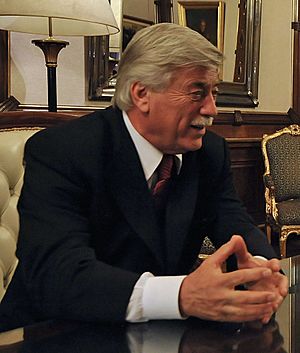Carlos Soria facts for kids
Quick facts for kids
Carlos Soria
|
|
|---|---|
 |
|
| Governor of Río Negro | |
| In office December 9, 2011 – January 1, 2012 |
|
| Lieutenant | Alberto Weretilneck |
| Preceded by | Miguel Saiz |
| Succeeded by | Alberto Weretilneck |
| Mayor of General Roca | |
| In office December 10, 2003 – December 9, 2011 |
|
| Preceded by | Miguel Saiz |
| Succeeded by | Martín Soria |
| Secretary of State Intelligence | |
| In office January 2, 2002 – July 10, 2002 |
|
| Preceded by | Carlos Sargnese |
| Succeeded by | Miguel Ángel Toma |
| National Deputy | |
| In office December 10, 1999 – January 2, 2002 |
|
| Constituency | Buenos Aires |
| Minister of Justice and Security of Buenos Aires Province | |
| In office September 21, 1999 – December 10, 1999 |
|
| Preceded by | Osvaldo Lorenzo |
| Succeeded by | Aldo Rico |
| National Deputy | |
| In office December 10, 1983 – September 21, 1999 |
|
| Constituency | Río Negro |
| Personal details | |
| Born | March 1, 1949 Bahía Blanca, Argentina |
| Died | January 1, 2012 (aged 62) General Roca, Río Negro, Argentina |
| Political party | Justicialist Party/Front for Victory |
| Spouse | Susana Freydoz |
| Children | Martín, María Emilia, Germán, Carlos |
| Alma mater | University of Buenos Aires |
| Profession | Lawyer |
Carlos Ernesto Soria (born March 1, 1949 – died January 1, 2012) was an Argentine lawyer and politician. He was a member of the Justicialist Party, a major political group in Argentina. Carlos Soria became the governor of Río Negro Province in December 2011. Sadly, he passed away on January 1, 2012, at his farm after New Year celebrations.
Contents
Carlos Soria's Journey
Early Life and Education
Carlos Soria was born in Bahía Blanca, Argentina, in 1949. He grew up in a small town nearby called General Daniel Cerri. His father, Ernesto Soria, was a strong supporter of Peronism, a political movement in Argentina. Because of his father's political views, the family moved to Bariloche and later settled in General Roca, Río Negro. There, they opened a local store.
Carlos Soria went to the University of Buenos Aires. He studied law and became a lawyer in 1973. That same year, elections brought Peronists back into power. Carlos Soria became involved in local politics, joining the Justicialist Party. When democracy returned to Argentina in 1983, he was elected to the Argentine Chamber of Deputies. This is like being a representative in the country's parliament.
Time in Congress
Carlos Soria served in the Argentine Congress for four terms in a row. He became the leader of the Constitutional Affairs Committee, which deals with important laws. He also worked on committees related to justice and other important national issues. He was part of a special committee that looked into major events in Argentine history.
Soria also worked to change laws. He wanted to make rules stricter for those accused of violent crimes. He also suggested a bill that would give special protection to members of Congress forever, but this idea was not approved.
In 1999, Soria was offered a spot on the Justicialist Party's list for Congress in Buenos Aires Province. Before the elections, he was appointed as the Provincial Minister of Justice. He then took his seat in Congress, representing Buenos Aires Province.
He became a strong voice in Congress against some government plans, like those that would cut public sector salaries. When President Fernando de la Rúa resigned in 2001, and Eduardo Duhalde became the temporary president, Soria was appointed as the Secretary of State Intelligence in 2002. This role involved managing the country's intelligence services.
Role in State Intelligence
Carlos Soria's time as Secretary of State Intelligence happened during a period of public protests. There was a sad event in June 2002 where two protesters, Maximiliano Kosteki and Darío Santillán, were killed by police officers. This incident caused a lot of public concern.
After this, Carlos Soria decided to run for Governor of Río Negro Province. He resigned from his intelligence role in July 2002.
Return to Río Negro
In 2003, Carlos Soria ran for governor of Río Negro Province but narrowly lost. However, later that year, he won the election to become the mayor of General Roca, Río Negro, which is the biggest city in the province.
He was very popular as mayor and was reelected in 2007 with a large majority of the votes. In 2011, he ran for Governor of Río Negro again. He had the support of the Front for Victory political group. Carlos Soria won the election in September 2011 with 51% of the votes, becoming the new governor.
His Passing
Carlos Soria passed away on January 1, 2012, at his farm near General Roca. He was with his family celebrating the New Year. He died from a gunshot wound. He was taken to a hospital but passed away shortly after. His funeral was a private event.
After his passing, the Vice-governor, Alberto Weretilneck, took over as the new governor of Río Negro.
See also
 In Spanish: Carlos Ernesto Soria para niños
In Spanish: Carlos Ernesto Soria para niños
- List of Argentine Secretaries of Intelligence
 | Laphonza Butler |
 | Daisy Bates |
 | Elizabeth Piper Ensley |

